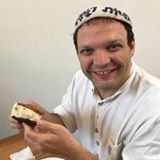Rabbi Jeremy Sher

Much of what Ha-Emek offers is closely aligned with Schwarz’s four propositions in Jewish Megatrends. We offer chochma, the wisdom of our textual tradition, to support each of our activities. Recent feedback suggests that just the level of Jewish knowledge offered by our small congregation’s leadership positions our Cantor, Jessica Leash, and I to answer basic questions and guide those interested toward ever more interesting questions. It helps that I speak Hebrew and am an Israeli citizen. Text—particularly the unique organic approach to text that I learned from my teacher, Rabbi Natan Margalit—connects us to our heritage and allows us to participate in the Jewish conversation.
We intentionally emphasize social justice in all our work. Building a new community affords us a unique opportunity to set the right tone from the outset, making it clear that Ha-Emek takes a progressive perspective grounded in deep respect for human rights. We offer a place of comfort and refuge, but not merely that, because that is no longer enough. We also exhort ourselves to take risks, placing our own privileges on the line for the rights of others. We applaud Schwarz’s emphasis on replacing the old ostentation with a more authentically Jewish tikkun olam agenda.
In our commitment to value every person individually, we believe intermarriage is not the problem. Our community in Silicon Valley is utterly rife, we believe, with younger interfaith couples and families who feel put out by the existing Jewish options. My training at Harvard Divinity School jibes with my professional experience in politics to suggest that removing barriers to entry, accepting everyone just as they are, and treating everyone respectfully results in them coming back wanting more. My modest proposal is that if we’re nice to folks we might see them again next week.
We aspire to offer kehillah in a down-to-earth way that is tailored to Silicon Valley. We emphasize potluck meals along with worship activities because meals help us build community, and because you never know who in the kahal might be hungry.
At the same time, we question the assumption that “technology has made,” or necessarily must make, “meaningful social intercourse much harder to come by.” That isn’t our experience. To the contrary, we use technology intentionally to build community. We serve a geographically disparate area, and we currently meet only once or twice a month; between meetings and across distances, our community gets to know one another on Facebook. We draw support and interest from friends of friends around the world, online. Relatedly—though not through Ha-Emek—I am launching a Facebook project to reduce the geographical and linguistic barriers between American and Israeli Reform Jews.
At Ha-Emek, we help every seeker find the kedusha in their life. My training in chaplaincy equips me to help congregants find meaning in the good and the bad of their experiences. Jessica Leash and I harmonize our often complementary approaches to ritual to weave the ecstatic, the scholarly, the contemplative, the joyful, and the commanded together into a tapestry of holiness that is unique while recognizably Jewish Renewal.
Our community in Silicon Valley is utterly rife, we believe, with younger interfaith couples and families who feel put out by the existing Jewish options. My training at Harvard Divinity School jibes with my professional experience in politics to suggest that removing barriers to entry, accepting everyone just as they are, and treating everyone respectfully results in them coming back wanting more. My modest proposal is that if we’re nice to folks we might see them again next week.
Conversely, many of our community’s demographic woes are self-inflicted. The first step to Jewish continuity in the 21st century is simply to stop kicking people out, whether on the basis of choice of spouse, political views on Israel, or anything else. I see burgeoning movements of young Jews rallying around politically left-wing causes and/or marrying non-Jews, opposed at every turn by the organized Jewish community. Imagine what would happen if we gave them support rather than opposition.
Schwarz is certainly right to raise the important point of tribal vs. covenantal Jewish identity. However, I don’t think covenantal identity is necessarily “soft”: that’s not what I’m seeing from millennial groups like If Not Now and Open Hillel. I think we’re observing what Buber and Soloveitchik called fate and destiny—and we need both. The post-Holocaust era of American Jewry emphasized the covenant of fate, corresponding to Schwarz’s “tribal” identity, and younger Jews now find this emphasis insufficient. Younger Jews have experienced less antisemitism and much less segregation: my mother attended a 95% Jewish public elementary school, and I did not. Younger white Jews also understand much more intuitively than their parents that they are on the privilege side of a racist social structure, even while they may suffer from antisemitism as well. From Main Street to Jerusalem, younger Jews simply don’t believe that we are the underdogs.
I would truly marry tribal and covenantal identity by refocusing on the covenant itself. Is there a double standard by which Jews and the Jewish state must be held to a higher standard? You bet. That double standard is the Torah. Everywhere I look, I see younger Jews working hard to remind us to be our best selves, to open our hearts, to embrace the stranger even if the stranger strikes us as strange. They are our future.
_____________________
Rabbi Jeremy Sher was admitted to OHALAH: The Alliance of Rabbis for Jewish Renewal after a successful career in political technology and entrepreneurship, and a six-year program of rabbinical study under Rabbi Natan Margalit, Ph.D., including the Master of Divinity program at Harvard Divinity School. He recently completed a full-year, full-time residency as a Chaplain Intern at Langley Porter Psychiatric Institute & UCSF Medical Center in San Francisco, is starting the new congregation Ha-Emek: Honest, Inclusive, Progressive Judaism in Silicon Valley, and has recently published his first book, Growth through Governance: What Every Jewish Nonprofit Leader Needs to Know.

